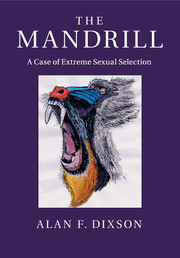Part III - Evolution and sexual selection
Published online by Cambridge University Press: 05 November 2015
Summary
In the last eight chapters, I have attempted to draw together as much information as possible, bearing upon the mandrill's natural history, including its distribution range, social organization, behaviour and reproductive biology. One goal of this exercise has been to provide some basis for discussing the evolution of this remarkable animal. Whenever possible, I have also included information about the drill, as this is the mandrill's closest phylogenetic relative; these two species being the only extant members of the genus Mandrillus. Although Charles Darwin (1871, 1876) thought that sexual selection must have played an important part in the evolution of the male mandrill's bright colouration, he had access to very little information about its behaviour or its reproductive biology. Knowledge concerning these matters during the nineteenth century was anecdotal. Indeed, although the mandrill's existence had been recognized by Conrad Gesner during the sixteenth century, it is only during the last 30–40 years that science has advanced beyond descriptions of its morphology and anatomy, to explore its behaviour, ecology, reproduction and evolutionary biology. Even now, much less is known about the drill than about the mandrill. However, enough has been learned to facilitate comparisons between the two species, and to discuss those traits that would most likely have been present in their common ancestor.
The following set of conclusions is intended to provide the reader with a brief synopsis of the evolutionary history of the genus Mandrillus, based upon the material presented in earlier chapters. Following this, the special topic of sexual selection, and its extreme expression in the mandrill, will be addressed in Chapter 10.
- Type
- Chapter
- Information
- The MandrillA Case of Extreme Sexual Selection, pp. 131 - 132Publisher: Cambridge University PressPrint publication year: 2015



